(Above) Dr. Jeff Pitcher wears a stethoscope and a red vest for Rescuers Without Borders, one of the many volunteer organizations providing support to Ukrainians
In Medyka, at the Polish-Ukrainian border, thousands of Ukrainians wait in line every day to cross into safety. It is the busiest border crossing in Europe. Volunteers from organizations worldwide assemble in a tent city, ready to provide medical aid, emotional support and food and essential items to Ukrainians. In March, Dr. Jeff Pitcher, a lifelong Salvationist, flew into Kraków, Poland, and drove three hours to Medyka where he volunteered with Rescuers Without Borders, a French and Israeli-based medical organization that provides relief in humanitarian crisis zones. Pitcher spent eight days serving in a medical tent and upon returning to his home in Orillia, Ont., he spoke with Abbigail Oliver, Salvationist staff writer, about his experience and how his faith motivates his volunteer work.
Tell me about your upbringing in the Army.
My parents are Majors David and Donna Pitcher, and my grandparents were Commissioner and Mrs. Arthur and Elizabeth Pitcher. I was adopted along with my twin brother while my parents were stationed in Vancouver. We grew up in the Army and I’ve been attending church at Army corps my whole life. Now, I’m a senior soldier at the Orillia Corps.
Growing up, my parents were stationed in various places. We moved from Vancouver to Oakville, Ont., then to Orillia where my dad worked at family services and my mom worked in women’s ministries and as assistant corps officer. Through their work, I saw how the Army helped people and it became engrained in me to help others. That is why I became a doctor.
The Army’s motto is “Heart to God, hand to man.” That is my motto as well. Wherever I can help people and show the love of Jesus to others, that is what I try to do, whether it’s in my work as a physician or in my humanitarian work. I try to live as the Bible teaches and to be an example of God’s love.
Can you tell me about your volunteer work with The Salvation Army?
I started doing disaster relief work with the Army after 9/11, my first experience of seeing the Army’s disaster relief work first-hand.
At Ground Zero, there was a large tent for food services and counselling,and there were smaller outposts where volunteers provided nutritional assistance and spiritual counselling. I helped with stocking the outposts and tried as best as I could to help the workers at the site. At that point, there were a lot of construction workers helping to clean up, as well as police officers and firefighters.
I was there for a few weeks. It was overwhelming to see whole city blocks destroyed and fences covered in posters of missing people. Everytime the first responders recovered a body, we would stop work on the site and form a line to pay respect to the lost life. The scale of the disaster and destruction was devastating, but I was glad to help people as they went through this traumatic event, to provide a hug and a listening ear and the kind of emotional support that they needed.
A few years later, I volunteered again with The Salvation Army after hurricane Katrina. We went down to Biloxi, Mississippi, about a week after the hurricane happened. The Salvation Army provided food stations, clothing and housing supports, and spiritual counselling.
What made you decide to go to Ukraine?
After seeing a posting by an American physician asking doctors to come over to the Ukrainian border, I knew I had the skills to help. With my previous experience volunteering with The Salvation Army, I knew what kind of situation I was getting into, though I had never been this close to a war zone before.
Because, for me, “Heart to God, hand to man” means showing the love of God through my actions and helping others, I felt compelled to go. So, I prayed about it and thought it was the right thing to do.
What happened when you got there?
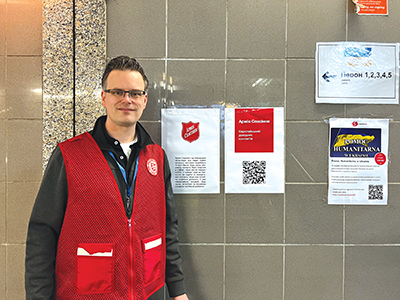
People travelling from across Ukraine were often coming from an active war zone and had been hiding in bomb shelters and subways for several weeks. They had managed to escape somehow, since the Russians weren’t allowing people to leave.
I was stationed in a medical tent where we provided care to people as they crossed the border. Since most hospitals and clinics in Ukraine were shut down, our medical tent treated common emergency room situations such as asthma exacerbations, coughs, colds or viral gastroenteritis caused by unclean water. We occasionally saw war wounds. We had some families and children come to us with shrapnel wounds. Some had gunshot wounds that had happened a week prior because it takes so long to get to the border.
One day, I spoke to an 80-year-old woman who had lived her whole life in Mariupol, and unfortunately lost many family members in the shelling. Her home was destroyed. She managed to escape in a car with her neighbour, driving through farmers’ fields while being shot at. It took them six days to get to the border. She was in a state of shock. She spoke about the needless destruction, and she couldn’t understand why the Russians were doing this. Her whole life is gone. Everything that she knew, her family, her house, everything is gone. “For what point?” she asked.
A lot of other people came to the border as the situation changed. Some places were safer than others, and as the Russians expanded into Ukraine, more people fled. One bag was all they could carry, usually. On average it took five to seven days to get across the country. When they reached the border site, there was a long line up to get across. If people were lucky, they might wait three or four hours. Other times it was upwards of 15 to 20 hours waiting in the freezing cold. At night, the temperature dropped below zero.
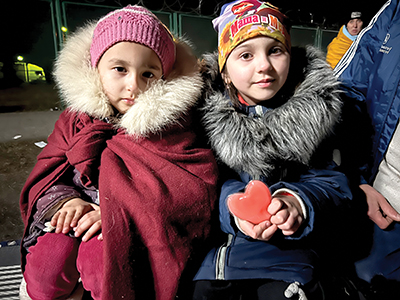
What impacted you most during your time there?
Seeing children—who should be in school learning—with bags under their eyes because they hadn’t slept. The children, and adults too, had a flat affect; you could tell that they had been through a lot. Many of them broke down and cried as soon as they got to the border, relieved to be in a safe area.
There were stories of people stuck in basements, subways and bomb shelters for several weeks. They had no clean water. One woman from Mariupol told me they had no food. They were drinking tea and eating crackers. They were starving. Their whole world was gone, too—their houses destroyed, their livelihoods gone, their friends and families killed.
A lot of them have faith and pray. Some of them are angry with God, asking, “How could God let this happen?” It was challenging to hear their stories, but important to be there for medical, spiritual and emotional support.
What happens once they reach the border?
At the tent city in Medyka, various humanitarian organizations offer everything from personal hygiene items such as toothpaste, toothbrushes and diapers, to food services that provide hot meals. There are also shelters where people can stay in a cot overnight or for a few days to rest, regroup their thoughts and figure out where they’re going. Most people picked up supplies they needed and volunteers took them to a processing centre in Poland. Each processing centre had anywhere from 2,000 to 5,000 beds and provided people with information about where to go from there. A lot of people have relatives in other parts of Europe, so volunteers provided transportation services to them. Some people didn’t know where to go, so there were social services set up to help them find a place to stay.
Can you tell me about the fundraising you did for this trip?
I raised more than $28,000, which allowed me to purchase thousands of doses of antibiotics, medications to stop bleeding, large boxes of gauze, intravenous supplies, blood pressure machines and pulse oximeters. All the medical supplies I brought were sent into Ukraine within 10 days and distributed throughout the country. People’s generous donations allowed me to send supplies that will save lives.
Did you have any contact with The Salvation Army while you were at the border of Ukraine?
While I was there, I was able to contact Colonel Kelvin Pethybridge, territorial commander of the EasternEurope Territory, and Major Elena Cotruta from Moldova, who gave me some information about The Salvation Army’s emergency response in Ukraine. I printed posters to set up around the border site that provided displaced Ukrainians with a list and phone numbers of Salvation Army units across Ukraine and surrounding areas, so people could call, receive assistance and have somewhere safe to go when they arrived at their destination.
The Salvation Army is doing amazing things around Europe for those fleeing Ukraine, as well as helping those who are internally displaced. They’re providing housing, personal needs and counselling to the people who have been displaced from war zones into safer areas of the country. But there is still a risk of war coming to those areas that The Salvation Army serves. We need to continue to pray for the people and for The Salvation Army in Ukraine.
This story is from:




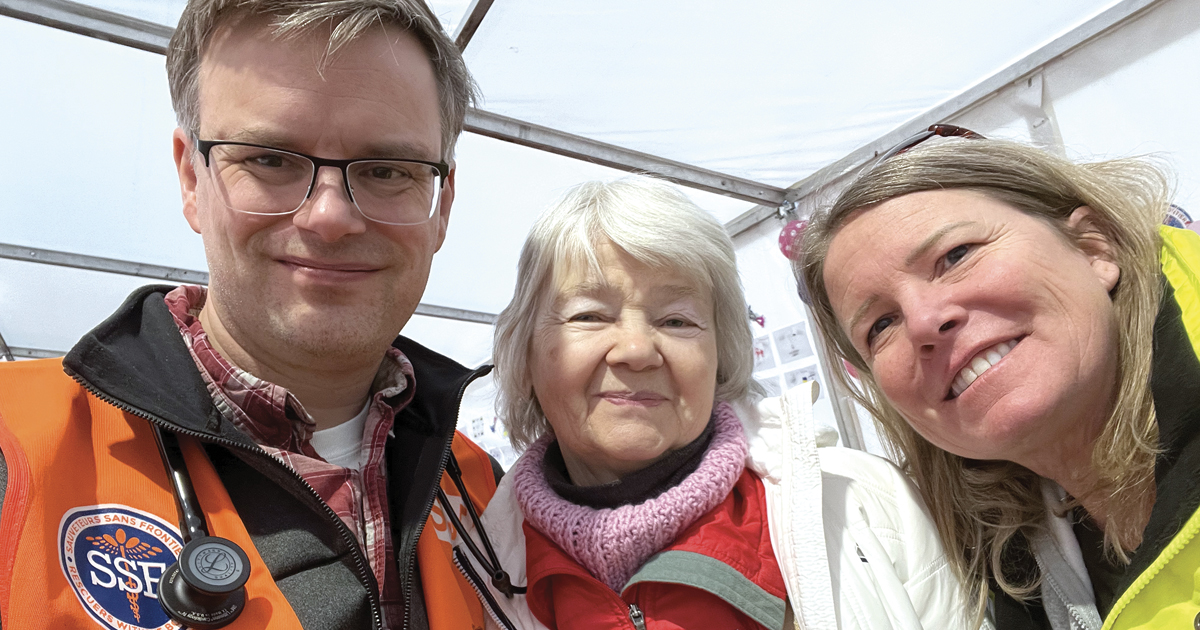
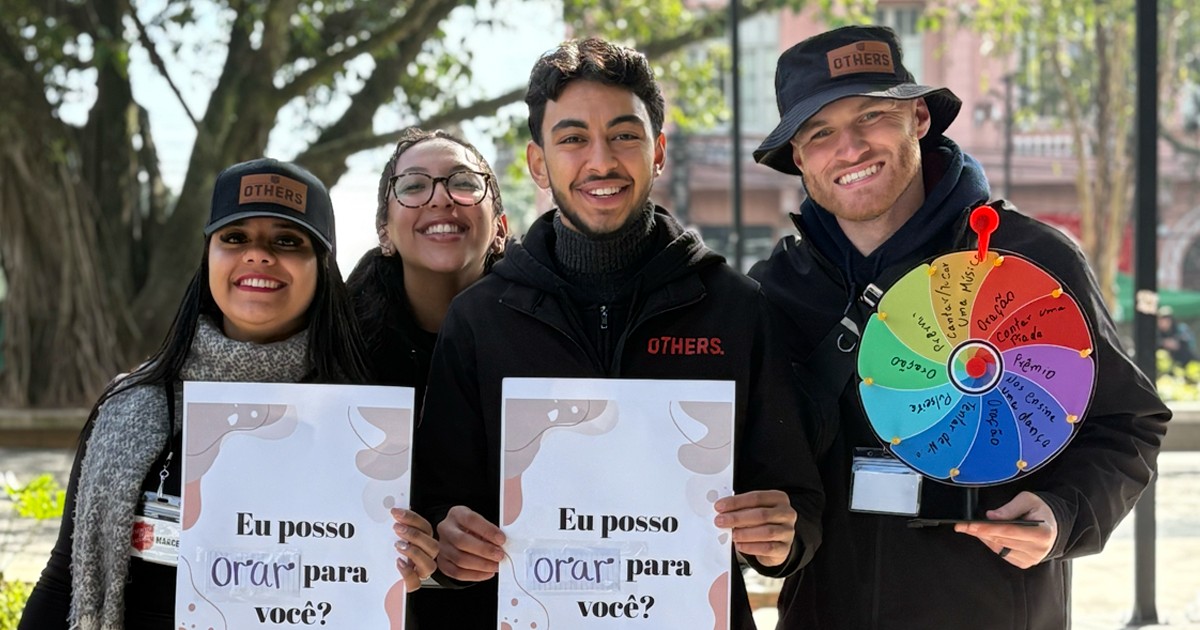

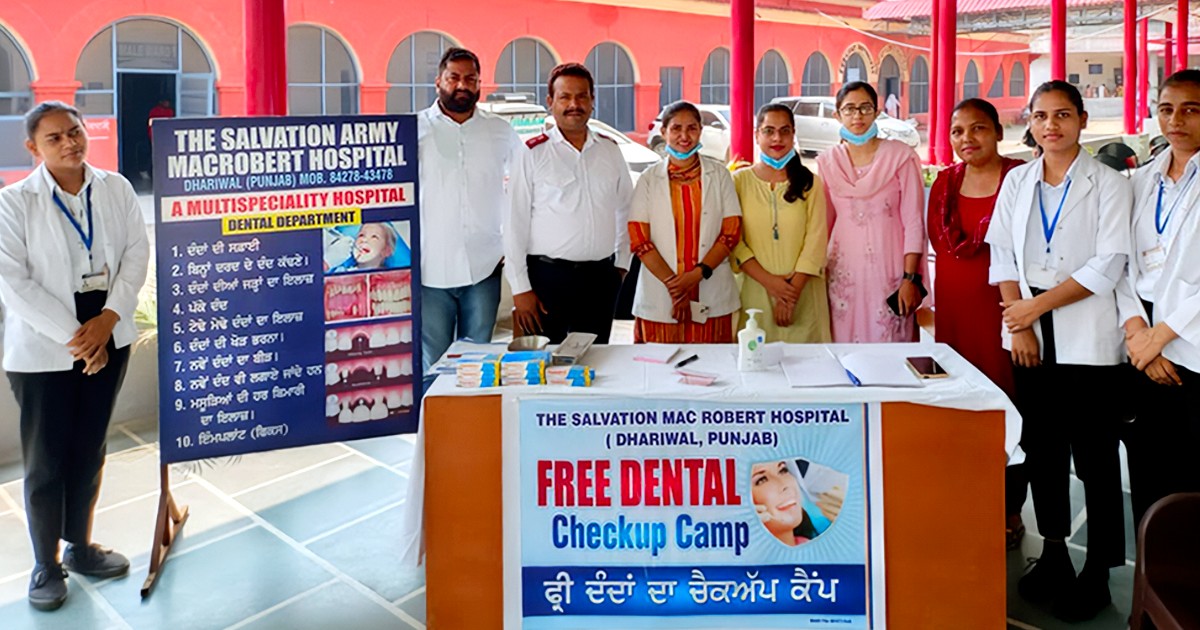


Thank you Dr Jeff for all you do.. you are truly an inspiration to all. Your love for God and all people is demonstrated in everything you do.